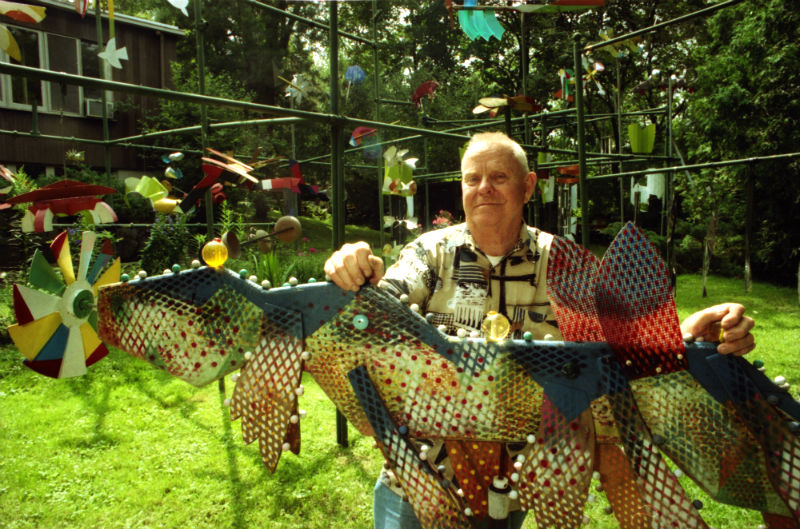Lend Him Your Ears: Isaac Levine's Fishpeoplebirds label celebrates the release of a new tape with a little help from his friends

Despite being a talented multi-instrumentalist and knowledgeable sound engineer, Isaac Levine's recordings and songs have a ramshackle quality. His off-kilter music is so eccentric, quirky, and whimsical that the label "outsider folk" doesn't fully capture the idiosyncratic spirit behind his songs.
Levine's lyrics are frequently surreal, too -- check out his October single "Modular Synth Trucker," a 36-second ode to a guy who drives his semi-truck from town to town playing his synthesizer. That's it, that's the tune.
One of his several bands, The Platonic Boyfriends, even released an album in 2018 called Pee on These Hands.
But Levine is also capable of pointed political commentary, especially involving issues in Washtenaw County, as he talked about with me for his 2018 solo album A Death So Obsessed With Living.
Levine is also prolific, and in addition to "Modular Synth Trucker," this fall he and Dr. Ruby put out the Dragon's Coldness tape on his Fishpeoplebirds label, which has this tag on its Bandcamp page: "label specializing in people that Isaac knows."
Some of the many talented people Isaac knows and works with are playing Argus Farm Stop on Saturday, Dec. 21, to celebrate a new Fishpeoplebirds tape with Rebeccah Rosen's music on the A-side and Levine and Rosen's Dreambag project on the other. Both of them will perform, and so will Kevin McKay -- whose dream-pop single "Headspace" came out in November and was recorded by Levine -- Jacob Rogers, and Lily Talmers.
Check music from the performers below:
High Five: New music from Dr. James Kibbie, Seattle Stomp, Dre Dav, Idle Ray & Ki5

Five new music releases from Washtenaw County artists.
By day, Kyler Wilkins works for Ann Arbor software company Menlo Innovations. By night, he's Ki5, creating lovely music influenced by hip-hop, electronica, and a capella. Wilkins builds songs from samples of his voice, and while it's loop-based music, it sounds anything but stuck in a loop. As heard on his new Looking for the Sun EP, Wilkins is an expert arranger of vocal harmonies, and his compositions bloom organically into gorgeous sonic flower grooves. Curious to see how Wilkins puts it all together live? Ki5 is the first artist to perform on the first night of Mittenfest (Dec. 27-29 at Riverside Arts Center in Ypsilanti).
As a member of Ann Arbor's Towner, Alex Molica makes fuzzy indie-punk that feels Midwestern to the core. The group's self-titled four-song EP from July is ramshackle and catchy with a heart-on-the-sleeve vocal delivery. But "Great Unknown," the first single from Molica's solo project, Seattle Stomp, is a stripped-down, quirky, acoustic-guitar-based song that is built on a repeating, descending chord progression for all four minutes it lasts. Molica has an album-release show for Seattle Stomp's Maudlin Madness on January 3 at St. Luke's Episcopal Church in Ypsilanti, but before that you can see Towner at The Blind Pig on December 20 as part of "Decemberween" with Detroit's The Lucid Furs, Ypsilanti's Bubak, and Ypsi-Arbor's You Look Poor! (I'm not yelling; the exclamation point is part of the band's name.)
UMMA's "Reflections: An Ordinary Day" explores quotidian moments in Inuit life

What one person might consider an ordinary, everyday scene, another might see as unusual and unique. It all depends on where you live, since cultures evolve in different ways that fit their environments. So, a person from the Caribbean might not recognize something from the Arctic as commonplace and vice versa.
Reflections: An Ordinary Day, an exhibit University of Michigan Museum of Art (UMMA) that features Inuit art, is filled with imagery of everyday tasks and mythologies of people who live in the Far North. But for people who live in the Midwest, these representations are anything but banal or commonplace.
This is the UMMA’s second exhibit of Inuit art and it gives viewers a chance to see even more works gifted by the Power family to the museum. In the newly named Eleanor Noyes Crumpacker Gallery, prints, drawings, and sculptures spanning from the mid-1950s to the 2010s are now on view through May 10, 2020.
The first exhibit, The Power Family Program for Inuit Art: Tillirnanngittuq, focused on the history of the Power family’s collecting and promoting art in the Cape Dorset area. While many of the pieces on display in Reflections: An Ordinary Day are direct promised gifts from the Power Family, others are purchases made possible by the Power Family Program, or gifts by donors such as Katherine Kurtz and Raburn Howland.
Works in the gallery span from the mid-20th century to the early 21st-century and feature Inuit artistic methods of inscription, printmaking, carving, and drawing. UMMA curator Vera Grant notes that the images selected for the exhibition are united in their depictions of “seemingly ordinary” everyday imagery.
We're All Crumpet Now: Kickshaw Theatre's production of David Sedaris' "The Santaland Diaries"

Despite the clichéd, eye-roll-inducing notion of creative work that makes you laugh and makes you cry, David Sedaris’ essays are nearly universally adored because they regularly, miraculously achieve just that.
This has become particularly true in recent years as Sedaris has explored, with bracing candor, the painful aftermath of a sister’s suicide and grappled with his complicated relationship with his aging, politically conservative father.
Yes, Sedaris and his craft have both come a long way since his hilarious, breakout 1992 radio essay “The Santaland Diaries” -- chronicling Sedaris’ work experience as a Macy’s elf in New York City during the holidays -- premiered on NPR’s Morning Edition. It’s since become a kind of subversive holiday classic, up to and including a one-man stage adaptation by Joe Mantello that’s now being produced (in Ypsilanti) by Kickshaw Theatre.
Inspiration, Aspiration, Expertise: “Gerome Kamrowski: Ann Arbor’s Own Surrealist” at The Michigan Art Gallery

Gerome Kamrowski in his backyard with his sculptures; first published in black and white in The Ann Arbor News, September 4, 1993. Photo by Photographer: D. A. Biermann.
I only met Gerome Kamrowski once. He granted The Ann Arbor News a 1993 interview for the paper’s annual old school “M-Edition,” a special start-of-the-school-year section.
We met at Kamrowski's tree-lined Waterhill residence where he had a detached studio. The place looked like a well-organized bead foundry -- only in this instance, the place had also been overrun by a menagerie of fantastic creatures.
Even at the age of 79, Kamrowski had the muscular heft of a lumberjack -- a handshake that griped like an iron vice -- and the soft-spoken grace of an artiste as he played with the rows of colorful beads he used to craft his late series of eccentric, surreal sculpture.
But Kamrowski's hypnagogic style wasn't a recent turn; he started to develop it 50 years prior when he lived in New York City.
During the winter of 1939/40, artful youths Kamrowski, William Baziotes (known to art historians), and Jackson Polack (known to the rest of us) were, in Kamrowski’s words, “fooling around” with lacquer paint in studio when they began throwing paint on canvases using a palette knife and a slashing gesture; ultimately overlaying paint upon layer of hard drying and smooth surface paint to create a muscular variation of French surrealist André Masson’s automatic drawing.
Borrowing a cliché that has stood the test of time: The rest was history.
Well, sort of …
Judy, Judy, Judy: Taylor Mac’s "Holiday Sauce" is a mischievous feast for the eyes, ears, and soul

Usually when I see a show for review, I don’t end up on stage, singing a Pogues song.
But then, most shows are nothing like Taylor’s Mac’s Holiday Sauce, which UMS brought to the Power Center on December 14 and 15.
Mac has so many talents that I’d wear out my hyphen key if I tried to list them all. A MacArthur “Genius” and finalist for the Pulitzer Prize, Mac created Holiday Sauce as a tribute to the playwright-singer-artist's drag mother, Flawless Sabrina. “She used to always say, ‘You’re the boss, apple sauce,” Mac said, referring to the show's title, and Sabrina regularly hosted "judy" and others during the holidays. (As Mac told the Los Angeles Times, "[M]y gender pronoun is 'judy’ because I wanted a gender pronoun that is an art piece.”)
And indeed, Mac’s final elaborate ensemble for the evening, which made judy resemble a majestic, snow-covered peak, featured what looked like a formation of tiny pine trees that spelled “BOSS” down the gown’s back.
Mac wore this while performing the show’s quietest and most personal number, “Christmas at Grandma’s,” wherein judy sat alone on stage and played ukulele. The darkly comic, ironically jaunty song chronicled what the holidays were like when judy was annually dragged to visit homophobic relatives who were themselves struggling with past sexual abuse, a serious head injury, and alcoholism.
So … a Norman Rockwell painting come to life, right?
But that’s the point, of course: While we’re all confronted each year by cultural depictions of perfect families joyously celebrating the holidays together, the reality is that a good number of us identify far more with the inhabitants of the Island of Misfit Toys.
Let’s Get Ready to Rumble: Ann Arbor Comedy Showcase features 30 female comics performing 90 seconds each

It started when comedian Bret Hayden decided to have a party.
“I wanted to have a Christmas celebration with my comedian friends, so I did it as a show and everyone showed up.”
That party has since blossomed into one of the fastest-growing local humor nights: The Comedy Rumble.
It's not your typical comedy night with an opener, warm-up, and headliner; instead, the Rumble is a lightning-fast show featuring 30 comedians doing material for 90 seconds each. The briskly paced routines are performed in front of a panel of professional comedian judges, with the top four vote-getters getting to do another quick set before a final winner is declared.
The show at the Ann Arbor Comedy Showcase marks the second anniversary of the Rumble. “We started at Cellarmen’s [in Hazel Park] in December of 2017,” Hayden says. “Since the first one went so well, I wanted to make it a regular event. After Cellarmen’s closed [in July], I talked to [Comedy Showcase founder] Roger Feeny, who knew me as a regular at the club. He was 100% on board and supportive, so we did our first show in Ann Arbor on October 30.”
The next one happens Wednesday, December 18, and this show is special because it is the second time the Rumble features female comedians only.
“About five or six years ago, when I first started in comedy, I could count on two hands the number of women comedians that I knew personally," Hayden says. "Comedy has always been overwhelmingly male, so I wanted to see if it possible to find 30 women comedians to perform.”
Bring the Noise: Benjamin Miller's Porcelain Hammer and Mark Morgan explore the far side of music

It was nearly 10 am on Tuesday, Oct. 2, 2019, when I turned on WCBN in my car. The University of Michigan student radio station is a staple in my listening routine, but even my catholic ears were surprised to hear noise icon Merzbow power-sawing his way through two tracks followed by fellow Japanese screechers Otomo Yoshihide and Keiji Haino just after breakfast time.
It was free-form radio at its free-formiest, but it was also a reminder that these Japanese artists -- among others on the outer fringes of music -- helped spawn a Southeast Michigan noise-music scene in the 1990s that, despite the difficult listening, spread through the DIY underground and helped hatch micro-scenes in various basements across the U.S.
The Michigan scene birthed in the 1990s grew up in the early 2000s -- think Wolf Eyes, Universal Indians, Princess Dragonmom -- and began to morph as artists left the state, changed the focus of their music, or left playing in bands entirely. Still, the scene continued to plug away and mutate with new groups emerging such as the more rocking Child Bite and Heavier Than Air Flying Machines, the dark and ambient Evenings, tape-based acts Sick Llama and Creode, coarse electronics from Lidless Eye, and electro-acoustic weirdness from The New Me, Glass Path, and more. There was also the recent Trip Metal festivals, founded by Wolf Eyes' John Olson, which brought together noise freaks, free jazzers, and assorted other sonic cosmonauts in Detroit for three days of plundering earholes.
And I can't forget Ann Arbor's mysterious Satan Face, an unnamed member of which appears to be responsible for playing Merzbow & Co. on the radio during otherwise pleasant mid-mornings. The Satan Face show Nothing but the '90s! is on WCBN every Tuesday from 9-11 am playing the harshest of the harsh, and that show's playlist could easily include Ben Miller's Porcelain Hammer and Mark Morgan, former guitarist for acclaimed art-rock act Sightings. Miller and Morgan lived away from Michigan for many years, but they've both returned to the Detroit area and are teaming up for a hair-parting concert on Saturday, Dec. 14, at Lo-Fi Bar in Ann Arbor.
Paper Tiger: Ann Arbor artist Matthew Shlian offers a new work via Ghostly and a retrospective book

I'm not a clumsy person -- in fact, I'm kinda athletic.
But I have the spatial awareness of a toddler.
I often have a hard time visualizing how something is created if I'm trying to replicate that thing from written instructions, a diagram, or a video. My brain doesn't translate the info in a way that my fumbling hands can follow.
Matthew Shlian's superpower is spatial awareness.
The Ann Arbor-based artist has the remarkable ability to build stunning 3D paper sculptures that undulate, pop, jab, and ripple. He creates his art by gluing together small pieces of paper and then affixing them in patterns that create the illusion of movement. Shlian's deep understanding of spatial relationships and shading allows him to create complex patterns that still seem minimalist.
Since 2011, Shlian has distributed many of his limited edition works through Ghostly International, which is best known for releasing electronic music but it's also had many partnerships with artists and companies to create branded pieces that run from shoes to a custom video-game console, as well as unbranded fine art from Andy Gilmore, Brandon Locher, and Langdon Graves.
Omoplata is Shlian's latest series promoted by Ghostly, and despite the artworks' delicate look, the design was inspired by a tricky submission move in Brazilian jiu-jitsu:
Ypsi-Arbor hip-hop collective KeepItG Records caps a busy 2019 with a benefit show and new album

The Ypsilanti/Ann Arbor hip-hop scene is so prolific that it feels like there's not a day that goes by that doesn't feature a new single, video, or concert from one of its artists or collectives. From the Approachable Minorities/Northern Threat Entertainment/734 Saturdays faction and Duke Newcomb's Dojo to Louis Picasso's Hiiigherminds and numerous other associations of DJs and MCs, there's been an ongoing hip-hop renaissance in Washtenaw County the past few years.
The KeepItG Records troop is among the most productive of these resolutely DIY groups -- and that's not even counting DJ Dyelow creating a beat every day of 2017. In addition to Dyelow, the crew includes producers/DJs/MCs Hi Potent C, DJ Cataclysmic, S.Delli, Aareus Jones, TwoFace Suave, and Caldane.
Many of these artists -- along with Denae, STY, Julia Furlong, and J. Donahey -- will come together on December 14 at Ziggy's in Ypsilanti for a breast cancer research fundraiser. It will also serve as something of a kickoff party for Dyelow and Hi Potent C's forthcoming album, War Medicine. The debut single, "Medicine," dropped December 5, and a new track is scheduled to be released every week until the album is fully out.
Below is a selection of 2019 videos, songs, and mixtapes by artists associated with KeepItG Records to help you play catch-up.


































